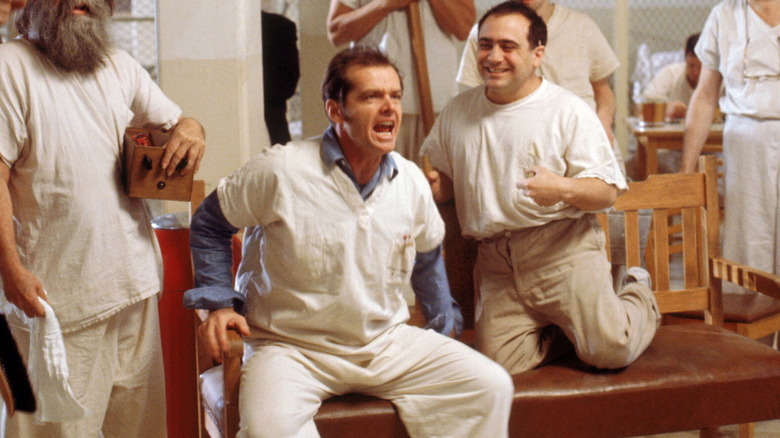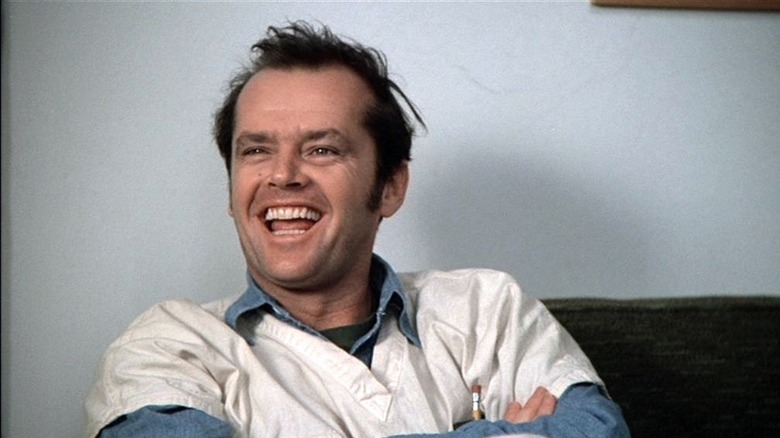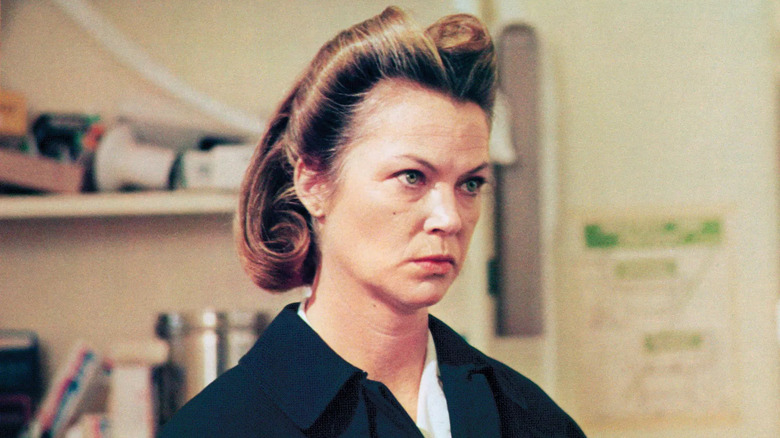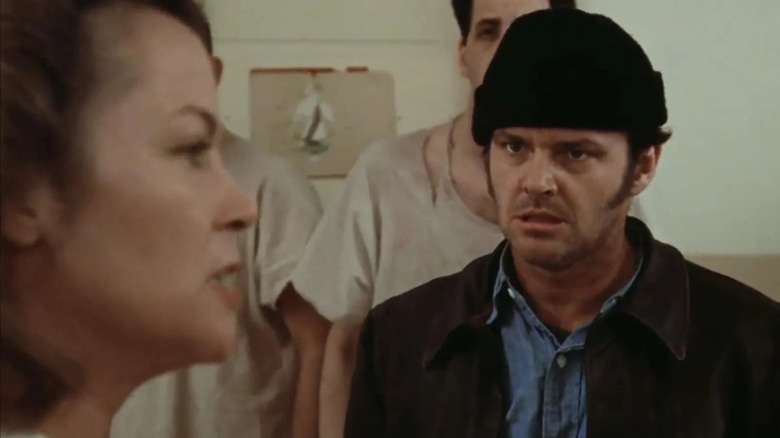This Was Jack Nicholson's Secret To His One Flew Over The Cuckoo's Nest Role
In the early stages of the troubled production of "One Flew Over the Cuckoo's Nest," potential director Hal Ashby suggested casting Jack Nicholson for the role of the movie's lead character, the swaggering scoundrel R.P. McMurphy. At this point in Nicholson's career, he was one of the most desired actors in Hollywood, fresh off yet another star-making performance in "Chinatown." The film's producer, Michael Douglas, was still unsure whether Nicholson was the man for the job, according to a 2017 Guardian piece. He knew Nicholson was talented, but he hadn't seen him play a role quite like McMurphy before.
Ultimately, while Ashby didn't end up directing — Miloš Forman would take on the project instead — Nicholson did star. While production had to wait for a gap in the actor's very busy schedule to start filming, it was worthwhile since the team got not only a fantastic performance but a leader on set. "Jack encouraged everyone to bring their A-game," said Douglas in the Guardian piece. "When you look at that baseball scene, with him rallying all the patients to watch the game on TV, that's just his inherent nature."
Like any good actor, Nicholson did extensive research for the role, from meeting actual patients in a psychiatric ward to even watching actual electroconvulsive shock therapy in preparation for his character going through the same. But according to Nicholson, the true secret to his performance in the movie came down to a secret character motivation, which he revealed in a 1986 New York Times interview.
”All right. The secret to 'Cuckoo's Nest' — and it's not in the book — my secret design for it was that this guy's a scamp who knows he's irresistible to women and in reality he expects Nurse Ratched to be seduced by him. This is his tragic flaw."
Enriching a role
"One Flew Over the Cuckoo's Nest," which is based on a 1962 novel of the same name, follows the plight of McMurphy, a convict who feigns insanity in order to be put in a mental institution rather than prison. When he arrives, he immediately clashes with the austere Nurse Ratched, and begins a series of rebellious acts with his fellow patients.
Having read the book himself, according to a 1975 Rolling Stone piece, Nicholson went into the role with a decent understanding of his character as it was written originally. But as an actor who also excels in improv, Nicholson also built on the role as he did his research and began to embody the character. This is likely where he developed the notion that McMurphy would believe himself capable of wooing the stern Nurse Ratched.
Watching his performance, it makes some sense. McMurphy spends his time in the film rebelling against the nurses and the traditional structures at the mental institution. In these efforts, McMurphy has a smug attitude, as if he's completely certain that he'll be able to break the nurses and earn the ability to do whatever he wants. Nicholson brought this idea to his co-star, Louise Fletcher, who played Ratched, which he explained in the New York Times interview.
"This is why he ultimately fails. I discussed this with Louise. I discussed this only with her. That's what I felt was actually happening with that character — it was one long, unsuccessful seduction which the guy was so pathologically sure of.”
A human antagonist
Nurse Ratched, a character who is so popular and widely discussed that it even spawned a "Ratched" spinoff series on Netflix, is the film's main antagonist and the foil to Nicholson's character. Even in her role as the movie's "villain," producer Michael Douglas wanted to make sure she was portrayed as human, which he explains in the Guardian piece.
"Making Ratched a human being was no small feat. You know nothing about her history, unlike McMurphy. I didn't want to make her a monster — I wanted to make her believable as a real person in those circumstances. I drew on the misuse of power, a prominent issue in those times with Nixon having been forced to resign. I saw very clearly how people can believe that they're doing good and they know best."
I believe the film succeeds in portraying a flawed, but realistic, person. Ratched runs the psychiatric ward like a prison, happy to manipulate the patients into staying in line and taking their medication on time. But in her mind, it's all for the good of the patients, who she sees as only as dangers to themselves and others. In order to protect them, she believes she must control them. Whether you agree with Ratched's viewpoint or not, it's a realistic worldview from someone who works in a psychiatric ward every day.
A more complex dynamic
While Nicholson's secret motivation for McMurphy works fantastically well for his character, it also makes a ton of sense for Louise Fletcher's Nurse Ratched that she'd react the way she did to McMurphy. As Nicholson mentioned in the Times interview, Fletcher was the only other performer he let in on McMurphy's plan to seduce the nurse, implying that he wanted her to perform as if her character was aware of what McMurphy was doing.
Ratched was extremely cold and professional, but especially so towards McMurphy, whom she immediately shows great disdain for — another decision likely influenced by Nicholson's secret motivation. She knows what McMurphy is doing and is both disgusted and shocked by the complete confidence with which he believes he can get her to fall for him. It's this clash of personalities and goals that creates the extremely interesting and tense relationship around which "One Flew" heavily revolves.
There are very few people who'd dispute how special of an acting talent Jack Nicholson is. He brings a unique presence to each of his many iconic roles. His ability to hone an intense maniacal energy and an edgy charm was unmatched, and even the great director Stanley Kubrick believed he brought an "unactable quality" to his roles that nobody could replicate. And in "One Flew Over the Cuckoo's Nest," Nicholson showed once again that he not only possessed fantastic acting range, making a complete scumbag seem palatable, and even charming, but that he had the ability to enrich an existing story through the adding of further context. Nicholson's now retired, and seemingly spends most of his time sitting in great seats at Lakers games, and it's a well-deserved ending for one of the greatest actors of our time.



